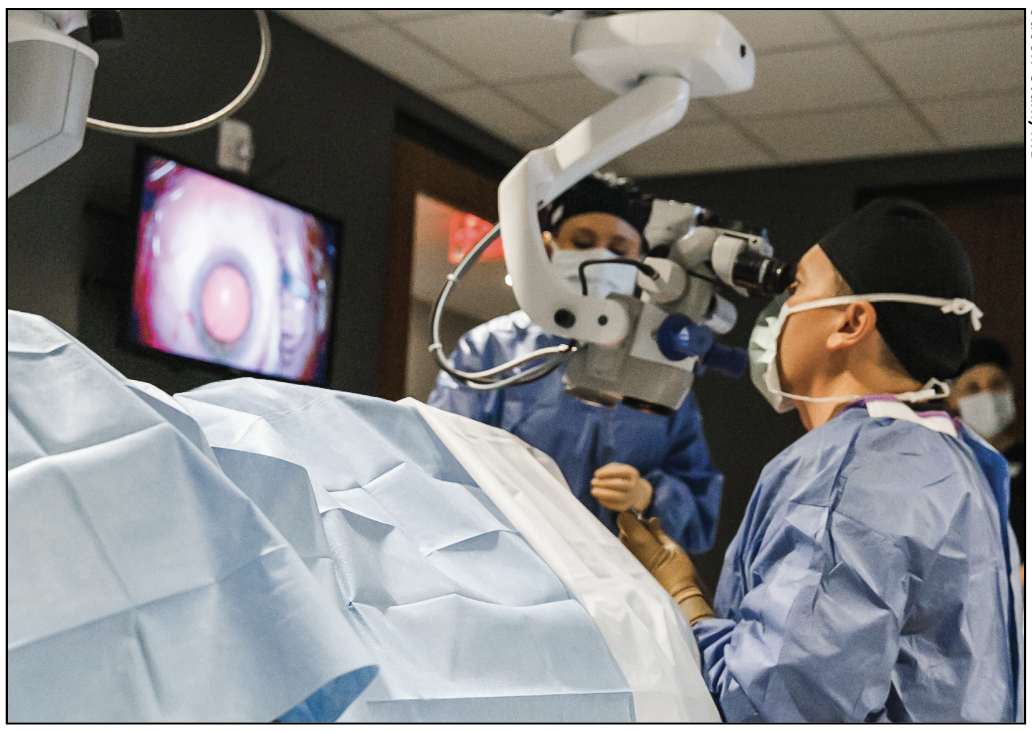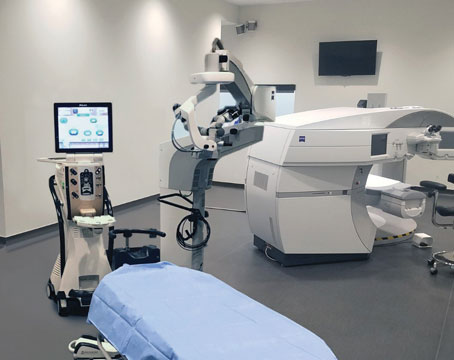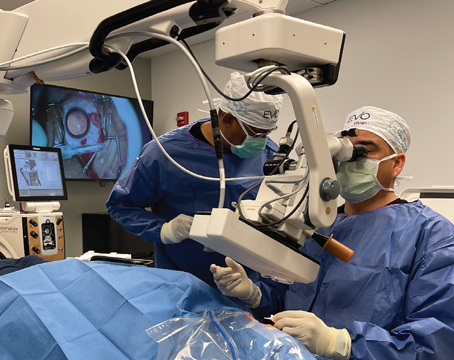Office-based cataract surgery continues to gain popularity and proponents say it offers some benefits over procedures performed in ambulatory surgery centers; however, safety concerns remain.
According to Lance Kugler, MD, who is in practice in Omaha, Nebraska, office-based surgery is the way of the future and is better for patients, surgeons and payers. “We’ve been performing in-office cataract surgery since 2017. At that time, there were a handful of centers across the country, and now there are at least 150 or 200 that I know of, and more are coming onboard every week. There is clearly momentum in that direction,” he says.
However, some ophthalmologists have expressed concerns about safety. Dr. Kugler and colleagues recently published an article that addresses the safety of office-based cataract surgery.1 The study found that the rate of adverse events for office-based cataract or refractive lens surgery is similar to or less than the reported adverse event rate for cataract surgery in the ASC setting. The study reviewed 18,005 cases of office-based cataract or refractive lens surgery performed at 36 clinical sites. The rate of postoperative endophthalmitis, toxic anterior segment syndrome, and corneal edema were 0.028 percent, 0.022 percent and 0.027 percent, respectively. Unplanned anterior vitrectomy was performed in 0.177 percent of patients. Additionally, 0.067 percent of patients returned to the OR, and 0.011 percent of patients were referred to the hospital. Dr. Kugler says the case count is now more than 30,000.
Patients
Surgeons performing in-office surgery say that there are benefits for patients. “Patients love it because it’s more comfortable and less intimidating. They are already comfortable with the office and the staff,” Dr. Kugler says.
Jason Stahl, MD, who is in practice in Overland Park, Kansas, agrees. His office has been performing office-based IOL surgery since January of 2020. “It’s a very similar experience to LASIK surgery,” he says. “Patients are familiar with the staff on the day of LASIK because it’s the same staff who worked them up in the clinic. It’s at the office, and so patients walk into surgery and walk out. The in-office IOL surgery, whether it’s refractive lens exchange or refractive cataract surgery, is very similar. It’s very familiar and comfortable for the patients, and they’ve embraced it. We’ve had patients who, for whatever reason, have had one eye done in an ASC and then the other eye done in-office, and they all comment on how much more comfortable they were with the experience in-office. That’s not to say that you can’t have a good experience in an ASC.”
Dr. Kugler adds that it can be anxiety-provoking for patients to have surgery in a hospital or ASC with IV anesthesia. “When a patient comes into a traditional surgery operating room, like an ASC or a hospital, he or she is immediately put in a gown, an IV is placed, and there are monitors on the wall indicating that he or she is about to have a big surgery. That causes a tremendous amount of anxiety, and I didn’t fully appreciate what it was doing to patients until we started using our office-based surgery center where we can perform surgery under oral anesthesia a majority of the time. Oral anesthesia without an IV is much more comfortable for patients. They are more relaxed, and they do better in that environment than they do with IV anesthesia,” he says.
 |
| Surgeons say that office-based cataract surgery, such as this shown here, can be less anxiety-inducing for the right patients, and can allow the surgeon to have more control over the cost and equipment, compared to an ASC or hospital. (Courtesy Jason Stahl, MD). |
Dr. Kugler’s center is class B certified, so there is a CRNA who can administer IV anesthesia, if necessary, but he says that it’s rarely needed.
Dr. Stahl says that patients with any significant health issues need to be operated on in an ASC that’s staffed by nurse anesthetists just in case there’s an issue. “These include cases that are maybe a little bit more complex, if the patient isn’t as healthy, or if the patient has enough anxiety to need IV sedation. We do not offer that in-office, so these are all reasons why I would elect to schedule someone at the ASC. I have plenty of colleagues who will do in-office cataract surgery on patients who require IV sedation and will have nurse anesthetists available. We would like to just stay with the class A certification where we only provide oral sedation,” he explains.
Dr. Stahl’s office trained its LASIK staff to assist in-office cataract surgery. “We trained them to do everything. Obviously, there’s a learning curve with anything, but they’ve done an amazing job. We were able to just train our current laser surgery staff to work in the cataract suite with us,” he says.
Dr. Kugler’s office added staff to provide office-based cataract procedures. “We added some staff and re-trained some existing staff,” he says. “To run a successful in-office suite, you don’t need to have registered nurses as part of your team, but if you want to be able to offer class B level with IV anesthesia, then you do need to have registered nurses on the team. You also need well-trained surgical technicians, so we trained a couple of surgical techs and also hired a couple of already well-trained surgical techs, so we have four surgical techs now as part of our team.”
When asked about the potential for complications, Dr. Stahl says that the in-office procedures performed in his office have been routine. “We take this very seriously. We all have training, we have a crash cart, and everyone has their basic life support training. We are prepared to handle something if it were to happen,” he says.
Other benefits include control and cost savings. “You’re in your own facility, where you can control the environment, the cost, the schedule, and the equipment,” Dr. Kugler says. “Additionally, it’s less expensive for payers. They can save money because many of the expenses associated with other facilities may not be necessary, such as anesthesia. Particularly for premium cataract surgery where there is a cash-pay portion, you can really save on expenses by performing surgery in an office-based surgery center rather than going to an ASC. The cost savings that’s passed on to the patient can be tremendous.”
The Price of Moving to Office-Based Surgery
According to Frank Cotter, MD, who is in practice in Roanoke, Virginia, cataract surgery migrating from the hospital to the ASC was likely to occur, because it was lower in cost and provided greater efficiency and quality. “This was done without any sacrifice in quality because the ASCs had to adhere to 600 conditions for coverage by Medicare,” he says. “Nurse anesthesia was by the patient’s side. You could take advantage of all the cost savings and convenience, without sacrificing patients’ safety. Some people believe that the further natural evolution is moving cataract surgery from the ASC to the office. While office-based cataract surgery maintains the convenience and cost improvement compared to hospitals, there are several problems related to quality, patient safety, and patient comfort. Regarding quality, ASCs have personnel dedicated solely to the execution of eye surgery. Office-based surgery enlists clinic personnel to multitask by assisting with surgery. The lack of staff focus, training and experience in the office-based surgery setting results in lower quality. However, the biggest quality decrease is the fact that you don’t have nurse anesthesia.”
He believes that cataract surgery is too intense to be performed in the office. Of the 3,600 procedures that Medicare reimburses for in an ASC, cataract surgery was ranked 6th in intensity per unit time.2 “This means that you can’t turn your attention away from what you’re doing to address an anesthesia need or a patient problem,” Dr. Cotter says. “You must stay focused on what you’re doing because you can’t just take all the instruments out of the eye and manage a problem. Procedures deemed less intense than cataract surgery include ventriculoperitoneal shunt, total knee, radical prostatectomy, rotator cuff and total hip. No one would consider performing them in the office.”
He notes that office-based surgery would benefit surgeons in that it makes it easier to create a venue for surgery. “Number one is the very onerous, very strict certificate-of-need laws in some states that prevent people from opening up enough ASCs to do all of our volume of cataract surgery,” Dr. Cotter says. “It’s very difficult to open a new ASC. Some ASCs are restrictive as to ownership, so it can be difficult and expensive for a young surgeon to get in. However, you always have to look first and foremost at what you are doing to the patient. I think if the patient realized that if he or she were to develop pain, discomfort or anxiety during the procedure that there was no nurse anesthetist there to manage it, he or she would not choose to have the procedure in that setting.”
Dr. Cotter adds that another concern is that there’s no requirement to have a back-up generator for office-based surgery. “Many of these procedures are performed in high rises where you can’t have a back-up generator. If the power goes out due to a storm or any other reason, you’re stuck. There are also the issues of air quality, water quality and infection control. There are 600 conditions for coverage that are designed for patient safety that these office-based surgeries are not required to maintain. While they must be accredited by the same bodies as ASCs, they don’t have the same accreditation criteria. They’re accredited as offices; ASCs are accredited as ASCs. It’s a totally different set of criteria,” he explains.
“Some patients in Virginia have had nightmare experiences during office-based surgery. If you develop a complication or a problem in an office-based setting and there’s no nurse anesthetist there, the patient’s going to go through abject misery,” Dr. Cotter avers. “Once patients are educated and informed about the comfort and safety advantages of ASCs, I just don’t think office-based cataract surgery is going to evolve. But, there are going to be great efforts to make office-based procedures grow. iOR is very convincing with young doctors.”
He also notes that there’s no Medicare reimbursement for office-based procedures. “Surgeons are only reimbursed for the IOL. There is no prospect of being reimbursed for the entire procedure. The earliest that could possibly happen is 2027,” Dr. Cotter adds.
For these reasons, Dr. Cotter doesn’t believe that office-based surgery is where we’re headed. “I’ve been doing this for a lot of years, and I’ve never seen anything pan out long-term that wasn’t in the best interest of the patient,” he says. “I think state legislators are going to slowly start loosening their certificate-of-need laws for ophthalmology because 80-plus percent of cataracts are now performed in an ASC setting. They will loosen up for cataract surgery so that it’s easier to open up an ASC. I think that’s the future.”
Dr. Kugler is medical director of in-office surgery company iOR Partners. Drs. Stahl and Cotter have no related financial disclosures.
1. Kugler LJ, Kapeles M, Durrie DS. Safety of office-based lens surgery: A US multicenter study. J Cataract Refract Surg. June 5, 2023. Published ahead of print.
2. Zwolak RM, Trout HH. Vascular surgery and the Resource-based Relative Value Scale five-year review. J Vasc Surg 1997;25:6:1077-1086.





